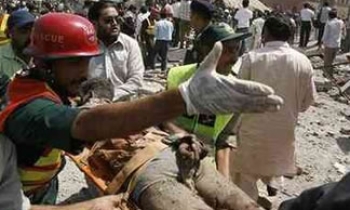After Google Print stumbled over a writers' block, it is now the turn of Google Earth to run into rough weather. Indian President APJ. Abdul Kalam has expressed concern about the free mapping program from Google, warning that it could help terrorists by providing satellite photos of potential targets.

The Google site contains clear aerial photos of Parliament building, Rashtrapati Bhawan, and surrounding government offices in New Delhi. There are also some clear shots of Indian defense establishments, apart from Indira Gandhi international airport.
Google Earth, an Internet site launched in June this year, allows users to access overlapping satellite photos. Although not all areas are highly detailed, some images are of a very high resolution, and some show sensitive locations in various countries.
Kalam, who is also the supreme commander of India's armed forces, made the comment over the weekend while addressing the nation's top police officers at the Vallabhabhai Patel National Police Academy at Hyderabad. Google has an engineering center in Hyderabad and another in Bangalore. The President said he was worried that "developing countries, which are already in danger of terrorist attacks, have been singularly chosen" for providing high resolution images of their sites.
"When you look deeper into it, you would realise that the specific laws in some countries, regarding spatial observations over their territory and UN recommendations about the display of spatial observations, are inadequate," Kalam pointed out. An intelligent mining of the data available on the Internet, according to the President, could give "indicators of pre-formation activities of terrorists groups and their origins and their supporters."
Whereas Google Earth has blocked many strategic US governmental locations from being available, similar areas in other countries are fully detailed by the free satellite mapping system. This has led to numerous concerns that terrorists would be able to access the information and use it for detrimental purposes. This would make developing countries, already in danger of terrorist attacks, even easier targets for those who seek to take advantage of the intricate mapping available.
Governments of South Korea and Thailand and lawmakers in the Netherlands have expressed similar concerns. Google Earth provides images of the presidential Blue House and military bases in South Korea, which remains technically at war with North Korea. The North's main nuclear facility at Yongbyon is also among sites in that country displayed on the service.

Even British defence experts had recently expressed concern over the service. British military bases and other sensitive sites have not been censored. Vulnerable targets include GCHQ, the Faslane submarine base on the Clyde and Fairford airfield, Gloucestershire, used by U2 spy planes.
"This is an artilleryman's dream," Patrick Mercer, shadow minister for homeland security, told The Telegraph. "Faslane and Selafield all have no-fly zones and for good reason. I see no reason why the government should not speak to Google and make sure details of national security do not appear."
Debbie Frost, spokesperson for Google, allayed fears of the Indian President, and said that the software uses information already available from public sources and the images displayed are about one to two years old, not shown in real time.
"Google takes governmental concerns about Google Earth and Google Maps very seriously. Google welcomes dialogue with governments, and we will be happy to talk to Indian authorities about any concerns they may have," Frost said in an email statement.
The Google official, however, justified the company's project saying, "It is built from information that is already available from a wide range of both commercial and public sources, and is no different in concept from the many other Internet-based imaging and mapping services that have been available for years." She said the same information was available to anyone "who flies above or drives by a piece of property."
A spokesman for Google UK too had parroted the same line: "We take any concerns about Google Earth and Google Maps seriously. But Google Earth was built from information that is already available from both commercial and public sources."
None of the US-based Google's officials have been able to justify why the White House is not there on Google Earth. It address American security concerns quite well, but wants to "talk" to other governments when it comes to theirs (the latter's).









